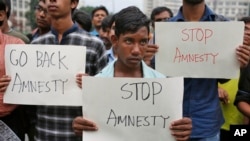Bangladesh has asked Amnesty International to retract its criticism of the country’s plan to execute opposition politicians convicted by a local war crime tribunal.
The International Crimes Tribunal of Bangladesh (ICT) condemned Ali Ahsan Mohammad Mujahid, a senior politician from Jamaat-e-Islami (JeI) and Salauddin Quader Chowdhury, a leader of the opposition Bangladesh Nationalist Party (BNP), in 2013 after convicting them of crimes during Bangladesh’s war of independence in 1971.
After their convictions and death sentences were upheld earlier this year, the two filed review petitions, which are to be heard by the country’s top court on November 17.
Amnesty said Mujahid and Chowdhury's trials “failed to meet international standards.”
The rights organization said two weeks ago, “since they now face the death penalty, the ultimate miscarriage of justice may be only days away.”
In a letter of protest sent to Amnesty's headquarters in London this week, Bangladesh called comments by the human rights group “intolerable.”
“This is exactly the kind of misleading propaganda run by those who opposed Bangladesh’s independence in 1971, continue to work against Bangladesh’s sovereignty and independence, and remain on the side of those convicted of crimes against humanity and genocide,” the protest note said.
Since the ICT was set up by Prime Minister Sheikh Hasina's government in 2010, several opposition leaders have been prosecuted for war crimes. Two, both JeI leaders, have been executed.
The cases of Mujahid and Chowdhury have been mired in controversy. Chowdhury has maintained that he was away in Karachi in April 1971 when the offenses he was charged with are said to have occurred.
Chowdhury’s relatives, supporters and others have sworn in affidavits they were with him in what was then known as West Pakistan in April 1971, but the tribunal ruled the affidavits inadmissible.
Amnesty accused of bias
The Bangladesh government says the Mujahid and Chowdhury trials, like others conducted by the tribunal, have followed proper judicial procedure.
Tureen Afroz, an ICT prosecutor, says Amnesty International is unfairly seeking to influence Chowdhury and Mujahid's cases.
“Amnesty International has been issuing such misleading statements very often and they are seeking to build a public opinion against the war crime tribunal," Afroz told VOA. "We all know that we cannot comment on a legal case which is sub judice [under legal consideration and cannot be discussed]. But, flouting the rule, Amnesty has been issuing critical statements in its attempt to influence the trial.”
Imran Sarker, a leader of Dhaka’s Gonojagoron Mancho, a group that seeks the executions of all who were involved in war crimes, said that Amnesty does not want war criminals to be punished.
“The influential war criminals are using money, connections and their lobbies ... and Amnesty International is issuing statements in favor of them," Sarker told VOA. "Any criminal [with] money and connections can win support from Amnesty.”
Prime Minister Hasina, too, criticized Amnesty.
“Amnesty is trying to protect the murderers like Chowdhury, Mujahid and others," Hasina said in Dhaka on Sunday. "We guess it received good amount of money from the war criminals, and so it is trying to protect them.”
Tribunal practices questioned
As a human rights group, Amnesty cannot distance itself from the ICT, said Abbas Faiz, the group's senior south Asia researcher.
“Technically what they are saying is that Amnesty International should not be concerned about their trials," he told VOA. "It's not right. We have to be concerned. We are a human rights organization. They cannot tell us not to be concerned.”
The constitution of the ICT cannot be legally challenged, which is unfair in terms of international human rights law, Faiz added.
“Unfortunately there is an article in the constitution that has been specifically inserted to stop or to put a bar on any legal challenge against the constitution of the international crimes tribunal,” Faiz said. “Everyone is pushing for the execution of these people. When you talk to them and ask 'do you know what the nature of these trials has been?' they say, 'it doesn't matter, they have to be executed.' That is really very, very strange.”
Bangladesh is seeking a “hasty end to a judicial process that is really flawed,” he added.
Alex Carlile, a senior British lawyer and a member of House of Lords, said that Chowdhury has not received a fair trial.
"For example, Mr. Chowdhury was not allowed to call all the defense witnesses he wished to call," Carlile told VOA. "His lawyers were put under pressure as has been the cases in many of the trials before this tribunal.”
The ICT has a history of following some “extraordinarily improper procedure” and there were clear examples of its judgments having been written by people who had no connection with the tribunal, Carlile said.
“There have been examples of lawyers being put under intolerable pressure. Make no mistake, to the jurists around the world, and I speak as one of them, the way which the ICT trials have been conducted is offensive and it puts Bangladesh in a very poor light,” he said.
Bangladesh's war for independence from what was then West Pakistan was a brutal conflict in which Bengalis in East Pakistan were targeted by the Pakistan military. In addition, the minority Hindu community also was reportedly singled out for attack. Bangladesh says as many as 3 million civilians died, although scholars say the number of casualties has never been verified and may be half that amount.










